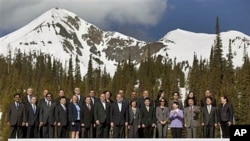Many political leaders say manufacturing the equipment needed to tap renewable energy is a key source of good jobs. The political rush to create such jobs is sparking conflicts among major trading partners as they scramble to serve the large new market and boost jobs for their own citizens. Those tensions may be part of the discussions at trade talks by the Asia-Pacific Economic Cooperation forum.
It will take thousands of workers to turn out the windmills, solar panels and biomass equipment needed to drastically increase the amount of energy that economies around the world get from renewable sources.
A report from the Pew Charitable Trusts says clean energy finance and investment hit nearly $200 billion in 2010 in the 20 largest economies, and the amount of such funding is soaring around the world, particularly in China.
President Barack Obama is one of many leaders who think factories that turn out clean energy equipment will help their nation use less imported oil, solve environmental problems, and cut the unemployment rate.
|
APEC by the Numbers
|
"The clean energy jobs at this plant are the jobs of the future," said the president. "Jobs that pay well, right here in America. And in the years ahead, it’s clean energy companies like this one that will keep our economy growing, create new jobs and make sure America remains the most prosperous nation in the world."
Obama made his remarks at a U.S. factory that turns out high-technology transmissions and other equipment for fuel-efficient vehicles.
His administration is pushing green technology as a source of jobs and exports, as well as a way to clean the environment.
The U.S. government, as the host this year for the Asia-Pacific Economic Cooperation forum, advocates cutting trade barriers for green technology. Starting Thursday, trade and business ministers from the 21 APEC nations are meeting in Big Sky, in the western U.S. state of Montana, and they are expected to take up the issue.
Already there are problems with green technology trade. The Obama administration is taking steps through the World Trade Organization to address a complaint that Beijing discriminates against foreign companies that want to sell green energy equipment in China.
A major U.S. labor union says jobs are at stake for its members because of what it calls China’s discriminatory rules.
Fred Bergsten of the Peterson Institute for International Economics said China supports its own manufacturers with low interest loans, requirements for government agencies to buy domestic products and in other ways.
"I think there is a pretty good chance that there will be some findings by what amounts to an international trade court that China is violating some of its global obligations," he said.
U.S. trade officials say they are holding consultations with China on what Washington says may be a prohibited subsidy under the WTO agreement.
There is a similar case brewing between two other APEC members: Japan accuses a Canadian province of treating foreign suppliers unfairly.
The premier of the Canadian province of Ontario, Dalton McGuinty, said green energy companies that want favorable treatment from the government will have to use a certain percentage of locally made products.
"New domestic content laws will ensure that Ontario's highly skilled workers are front and center in the green economy," said McGuinty.
An expert in international trade law, attorney Larry Herman, said that Canada will probably argue that all potential suppliers, from any nation, will have to meet the same domestic content requirements.
He said the WTO will look at trade rules and examine practices, such as requiring domestic content, or giving local companies financial support, for evidence of illegal discrimination against foreign suppliers.
“Does it treat foreigners worse than domestic suppliers? And secondly, are these measures, aspects of these measures illegal subsidies?” asked Herman.
Herman said both of these cases are at an early stage in what may be a long and complex procedure. He said companies and government officials in many countries will be watching the WTO rulings closely for guidance on how far they can take their own efforts to push for more local jobs, and how much they can do to open potential markets to their products.
But the U.S. Trade Representative’s office hopes APEC can reduce many such problems. In a statement laying out its goals as the APEC host this year, the USTR office said APEC “will accelerate efforts” to reduce barriers in environmental goods, and will encourage efforts to expand the development of clean energy programs.
The APEC ministers responsible for trade and small and medium-sized businesses also will discuss efforts to eventually create the Free Trade Area of the Asia Pacific. As part of that long-term goal, nine APEC nations, including the United States, Vietnam and Peru, are working on a free-trade deal known as the Trans-Pacific Partnership.
They hope to have the general structure of an agreement ready before the annual APEC leaders’ summit, which will be held in November in Hawaii.




